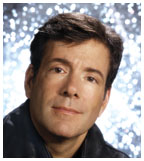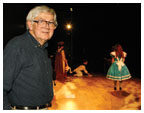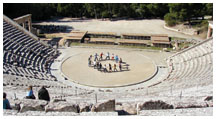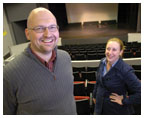July 16, 2008: Books and Arts
Staging the Greeks
A new course marries literary analysis and dramatic performance
For a complete list of books received, click here.
The physicist-heroes in Mark Alpert '82's thriller must solve Einstein's unpublished theory and keep it from the bad guys. (Sigrid Estrada) |
Reading
Room
Mining
Einstein's theory
Mark Alpert '82 pens scientific thriller in which physicists
are heroes
By Eric Hand '97
When the theories of quantum mechanics emerged in the 1920s, it quickly became clear that they posed a problem for physics. The theories contained strange notions of duality and indeterminacy: the idea that light could be both particle and wave, and in two places at once. And though the theories did a good job of explaining small things — the forces at the level of the elementary particles — they did not jibe with the force acting on a big scale: gravity.
Albert Einstein, fresh from explaining gravity with his elegant theories of general relativity, believed the two arenas could be reconciled, and obsessively went after a solution — but to no avail. "He just kept at it, with one attempt after another," says Mark Alpert '82, an editor at Scientific American magazine and an astrophysics major at Princeton.
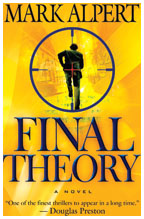 Alpert
uses that history as the premise for his new novel, Final Theory,
published by Touchstone Books in June. What if Einstein had discovered
a theory that unified all of the fundamental forces in the universe? And
what if the implications of that theory so threatened the world that he
had to hide it?
Alpert
uses that history as the premise for his new novel, Final Theory,
published by Touchstone Books in June. What if Einstein had discovered
a theory that unified all of the fundamental forces in the universe? And
what if the implications of that theory so threatened the world that he
had to hide it?
The thought experiment sets in a motion a scientific thriller, a find-the-theory-before-the-bad-guys chase that pits the hero, a historian of science and former student of one of Einstein's protégés, against FBI agents and a ruthless mercenary who wants to use the theory to create a weapon more deadly than the atomic bomb.
The paper Alpert co-wrote for his senior thesis, on the nature of gravity in a two-dimensional flatland, makes an appearance in the story as a hint to Einstein's theory of everything.
Like his hero, Alpert has a passion for science that was fulfilled only after leaving it. Alpert traded astrophysics for poetry, earning an M.F.A. at Columbia University. Eventually he wound his way back to science as a writer for Scientific American.
If nonscientists think physics is dull and deadly serious, Alpert's novel provides a jolt. The body count rises quickly as the physicist-heroes, red-blooded and salty-mouthed, lurch from one crisis to the next, with no pocket protectors in sight.
Alpert points out that the chaos isn't too far from the truth: Many physicists led flamboyant, messy lives. Even Einstein's grandfatherly image is belied by a far more checkered history: He gave up a daughter for adoption, and left his first wife so that he could marry his cousin. "He would start fights; he would storm off," says Alpert.
Even if Einstein never found a shining, orderly theory for everything,
Alpert's novel offers an exploration of the dark, disorderly side of physics.
Perhaps it represents Alpert's own unified theory. "I have this view
of human nature," he says, "that there's a lot of messiness
in the world." ![]()
Eric Hand '97 is a reporter for Nature.
For a complete list of books received, click here.
 The Yellow
Leaves: A Miscellany — Frederick Buechner '47 (Westminster
John Knox Press). In this collection of essays, short stories, and poems,
the author reflects on experiences in his life and on commonplace activities
in which he finds the presence of the divine — a drive with his
elderly mother, the death of an aunt, the struggles of a disabled relative.
An ordained Presbyterian minister, Buechner is the author of Listening
to Your Life: Daily Meditations with Frederick Buechner.
The Yellow
Leaves: A Miscellany — Frederick Buechner '47 (Westminster
John Knox Press). In this collection of essays, short stories, and poems,
the author reflects on experiences in his life and on commonplace activities
in which he finds the presence of the divine — a drive with his
elderly mother, the death of an aunt, the struggles of a disabled relative.
An ordained Presbyterian minister, Buechner is the author of Listening
to Your Life: Daily Meditations with Frederick Buechner.
 Sex at Noon Taxes
— Sally Van Doren '84 (Louisiana State University Press). Winner
of the 2007 Walt Whitman Award from the Academy of American Poets, the
poems in this collection mix narrative, painterly images, and linguistic
ambivalence as they explore the struggle between mind and body. The author
ruminates on sex, marriage, and the imprecise nature of language. Van
Doren teaches creative writing in the St. Louis public schools.
Sex at Noon Taxes
— Sally Van Doren '84 (Louisiana State University Press). Winner
of the 2007 Walt Whitman Award from the Academy of American Poets, the
poems in this collection mix narrative, painterly images, and linguistic
ambivalence as they explore the struggle between mind and body. The author
ruminates on sex, marriage, and the imprecise nature of language. Van
Doren teaches creative writing in the St. Louis public schools.
 Beyond the Hoax:
Science, Philosophy and Culture — Alan Sokal *81 (Oxford).
In this essay collection, the author revisits a fake scholarly paper —
a parody of postmodern research and an attack on relativism — that
he submitted to an academic journal, which published it in 1996. Sokal
argues that the issue he raised — postmodernists' disregard for
evidence — remains pressing, particularly among pseudoscientists
and religions, which, he claims, promote as "truth" ideas that
lack factual evidence. Sokal is a physics professor at New York University.
Beyond the Hoax:
Science, Philosophy and Culture — Alan Sokal *81 (Oxford).
In this essay collection, the author revisits a fake scholarly paper —
a parody of postmodern research and an attack on relativism — that
he submitted to an academic journal, which published it in 1996. Sokal
argues that the issue he raised — postmodernists' disregard for
evidence — remains pressing, particularly among pseudoscientists
and religions, which, he claims, promote as "truth" ideas that
lack factual evidence. Sokal is a physics professor at New York University.
![]()
By K.F.G.
For a complete list of books received, click here.
(Photo by Beverly Schaefer) |
Alice at the Opera
Photographed onstage during a dress rehearsal, composer Peter Westergaard
*56, an emeritus professor of music at Princeton, directed the world premiere
of his latest opera, Alice in Wonderland, May 22 in Alexander Hall's Richardson
Auditorium. He had been thinking about writing the work for five decades,
explaining that the Lewis Carroll tale made for a good opera because of
its "vivid characters" and its "extraordinary world where
the rules are all different." The opera traveled to New York City's
Peter Jay Sharp Theater in Symphony Space June 3–4. A cast of seven
played 38 roles and made up the orchestra, playing English handbells (loaned
by collector Scott Parry '54), bird whistles, tambourines, drums, and
other percussion instruments. Michael Pratt, of the Princeton University
Orchestra and a longtime collaborator with Westergaard, conducted. ![]()
Students, singing "Old Nassau" at Epidaurus in Greece, traveled to the ancient theater to inspire their work on a Greek tragedy to be performed next fall in the Berlind Theatre. (Courtesy Tim Vasen) |
Staging
the Greeks
A new course marries literary analysis and dramatic performance
By Deborah Yaffe
After six weeks' intensive study of ancient Greek drama, a group of Princeton students stood in the 2,400-year-old amphitheater of the Greek city of Epidaurus, a space renowned for its acoustics. One by one, they mounted the stage to sing, declaim, or chant in tones destined to reach the 55th row.
"Each of us got up on the platform, and the first thing we could say was, 'Wow!'" says Lucas Barron '09.
That study trip to Greece during the University's March spring break came at the midpoint of a new course, "Re: Staging the Greeks," which married literary analysis to dramatic performance and will culminate in the fall with a production in McCarter Theatre Center's Berlind Theatre.
The course treated Greek plays as works "meant to be seen and heard, not meant to be studied and read," says Tim Vasen, a lecturer in the theater and dance program, who taught the class with program director Michael Cadden. "We can re-create this as living theater that was created for that society to talk to itself, about itself," adds Vasen.
The 16 students, all experienced actors, auditioned for the class and by midsemester had read the complete 44-play ancient Greek canon.
Each week, the class devoted one meeting to academic discussion and one long afternoon to presenting previously rehearsed scenes, in styles ranging from the straightforward to the radical. One group of students experimented with shadow theater, performing part of a scene behind a white sheet; another updated Aristophanes' bawdy, topical comedy Lysistrata with references to their own sex lives.
Their immersion in Greek drama, students said, enriched the study trip, which was financed by the Program in Hellenic Studies. The group toured museums and ancient sites, worked with Greek actors and directors, ate grilled octopus, watched the sun rise over the Acropolis, swam in the Aegean Sea ("It was freezing — oh, my God!" says Rebecca Foresman '10. "That's something they definitely don't tell you in the legends!"), and saw a Greek-language production of Shakespeare's The Tempest.
They also conducted academic business, gathering on the roof terrace of their hotel with the illuminated Parthenon looming in the background to debate — in the spirit of Athenian democracy — which play to perform in the fall.
With the class split after days of discussion, Sam Zetumer '09 suggested breaking the deadlock in an appropriately Greek way, by introducing an element of chance — what Zetumer says the ancients saw "as a way of including the gods in your choice." So they placed the ballots in a pillowcase and picked the winner: a combination of two tragedies, Aeschylus' Agamemnon and Euripides' Iphigenia at Aulis.
For Agamemnon, one of the oldest plays in the Greek canon, the students will use a translation by Princeton comparative literature professor Robert Fagles, who died just days after the group returned from Greece. For Iphigenia at Aulis, one of the last plays in the canon, they will use a new translation by Barron, a comparative literature major.
The pairing of legendary scholar and emerging talent represents, Vasen
says, "a torch passing." ![]()
Deborah Yaffe is a writer in Princeton Junction, N.J.
Rob Melrose '92 directs wife Paige Rogers '89 in "Bone to Pick," a new play produced by their company, Cutting Ball Theater, in San Francisco. (Alan Dep/Marin Independent Journal: http://www.marinij.com) |
Reinterpreting
a classic
Rob Melrose '92 and Paige Rogers '89 present a new take on the
Minotaur tale
By E.B. Boyd '89
Most people remember the Greek myth of the Minotaur as the heroic tale of brave Theseus slaying the half-man, half-bull who roamed the labyrinth of Crete. A new production scheduled to run through Aug. 16 at San Francisco's Cutting Ball Theater explores a different side of the story. The one-woman play, Bone to Pick, directed by Rob Melrose '92 and performed by Paige Rogers '89, focuses on Ariadne, the princess of Crete who betrays her father to help Theseus. On their voyage back to Athens, however, the young hero reneges on his promise to marry the girl and instead abandons her on a deserted island. Bone to Pick, a new play commissioned by Cutting Ball, imagines Ariadne languishing there 3,000 years later. "At its core, it explores women's power and the transgressions that they commit and get coerced into committing," says Melrose, who with Rogers, his wife, founded Cutting Ball in 1999.
Cutting Ball has developed a reputation for squeezing something new out of the classics. Named for a cutpurse who ran with Shakespeare's crowd, the company has garnered kudos for the way it reinterprets plays like The Taming of the Shrew, No Exit, and Endgame. "Cutting Ball makes perennials seem as if they were written yesterday," said San Francisco magazine last year, when it included the company in its annual "Best of San Francisco" issue. "Melrose has a talent for mining classics for hidden themes and bringing musty old texts to life," said the San Francisco Weekly in its own "Best Of" list in 2006.
Melrose, the company's artistic director, and Rogers, a company actor and associate artistic director, met at Princeton, where they both majored in English and received certificates in Theater and Dance. They married in 1993. A year-long grant to study Shakespeare productions in Europe in 1997 planted the seed for Melrose's subsequent interpretations. European companies re-translate Shakespeare once every decade, to keep the language current. From that practice, Melrose learned to comb methodically through texts, searching each word, phrase, and scene for every possible meaning. The approach has led to intriguing departures, like a Taming of the Shrew that is more about identity than subjugation and a Macbeth that portrays the ruthless Lady Macbeth as a grief-stricken mother distraught over the loss of a child.
Melrose has directed at the Guthrie Theater and the Actors Collective
and this year was assistant director of New York's Shakespeare in the
Park production of Hamlet that ran through June 29. "Due
to media, due to Game Boys, due to technology and the world as it is today,
theater is not what it used to be," says Rogers. "Rob has an
idea about where the form might be in 100 years. I think he's going to
be looked at as one of those people who saw the future a little bit and
led other people on the path to it." ![]()
E.B. Boyd '89 is a writer in San Francisco.



